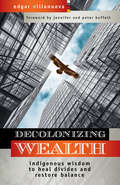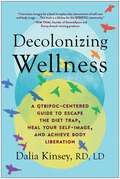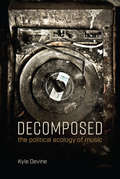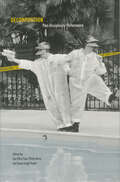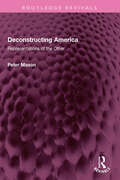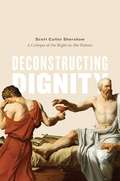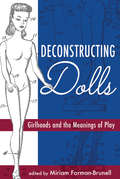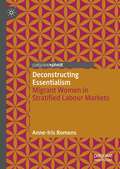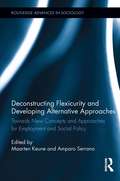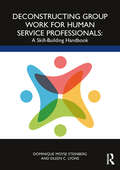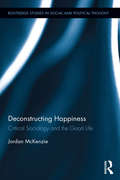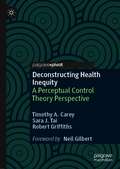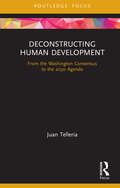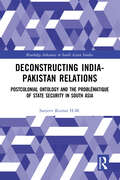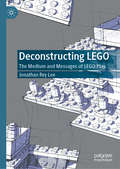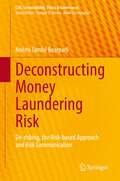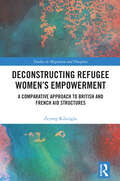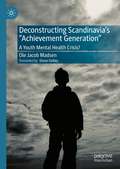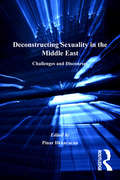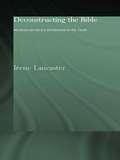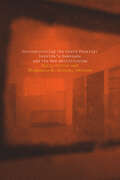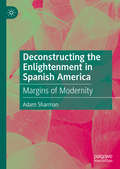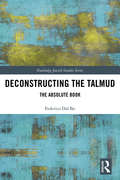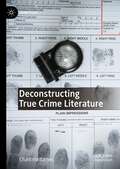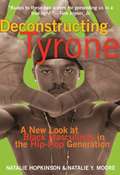- Table View
- List View
Decolonizing Wealth: Indigenous Wisdom to Heal Divides and Restore Balance
by Edgar VillanuevaDecolonizing Wealth is a provocative analysis of the dysfunctional colonial dynamics at play in philanthropy and finance. Award-winning philanthropy executive Edgar Villanueva draws from the traditions from the Native way to prescribe the medicine for restoring balance and healing our divides. Though it seems counterintuitive, the philanthropic industry has evolved to mirror colonial structures and reproduces hierarchy, ultimately doing more harm than good. After 14 years in philanthropy, Edgar Villanueva has seen past the field's glamorous, altruistic façade, and into its shadows: the old boy networks, the savior complexes, and the internalized oppression among the “house slaves,” and those select few people of color who gain access. All these funders reflect and perpetuate the same underlying dynamics that divide Us from Them and the haves from have-nots. In equal measure, he denounces the reproduction of systems of oppression while also advocating for an orientation towards justice to open the floodgates for a rising tide that lifts all boats. In the third and final section, Villanueva offers radical provocations to funders and outlines his Seven Steps for Healing. With great compassion—because the Native way is to bring the oppressor into the circle of healing—Villanueva is able to both diagnose the fatal flaws in philanthropy and provide thoughtful solutions to these systemic imbalances. Decolonizing Wealth is a timely and critical book that preaches for mutually assured liberation in which we are all inter-connected.
Decolonizing Wellness: A QTBIPOC-Centered Guide to Escape the Diet Trap, Heal Your Self-Image, and Achieve Body Liberation
by Dalia Kinsey2022 NATIONAL INDIE EXCELLENCE AWARDS WINNER — LGBTQIA NONFICTION "The author offers an empowering perspective for people whose identities are often marginalized in the health and wellness industry." —Manhattan Book Review Become the healthiest and happiest version of yourself using wellness tools designed specifically for BIPOC and LGBTQ folks. The lack of BIPOC and LGBTQ representation in the fields of health and nutrition has led to repeated racist and unscientific biases that negatively impact the very people they purport to help. Many representatives of the increasingly popular body positivity movement actually add to the body image concerns of queer people of color by emphasizing cisgender, heteronormative, and Eurocentric standards of beauty. Few mainstream body positivity resources address the intersectional challenges of anti-Blackness, colorism, homophobia, transphobia, and generational trauma that are at the root of our struggles with wellness and self-care. In Decolonizing Wellness: A QTBIPOC-Centered Guide to Escape the Diet Trap, Heal Your Self-Image, and Achieve Body Liberation, registered dietitian and nutritionist Dalia Kinsey will help readers to improve their health without restriction, eliminate stress around food and eating, and turn food into a source of pleasure instead of shame. A road map to body acceptance and self-care for queer people of color, Decolonizing Wellness is filled with practical eating practices, journal prompts, affirmations, and mindfulness tools. Ultimately, decolonizing nutrition is essential not only to our personal well-being but to our community&’s well-being and to the possibility of greater social transformation. This is a body positivity and food freedom book for marginalized folks. It&’s a guide to throwing out food rules in exchange for internal cues and adopting a self-love-based approach to eating. It&’s about learning to trust our bodies and turning mealtime into a time for celebration and healing. It&’s also a love letter to those of us who struggle with our bodies and a gentle plea for us to do the work it takes to accept, trust, and love ourselves.
Decomposed: The Political Ecology of Music (The\mit Press Ser.)
by Kyle DevineThe hidden material histories of music.Music is seen as the most immaterial of the arts, and recorded music as a progress of dematerialization—an evolution from physical discs to invisible digits. In Decomposed, Kyle Devine offers another perspective. He shows that recorded music has always been a significant exploiter of both natural and human resources, and that its reliance on these resources is more problematic today than ever before. Devine uncovers the hidden history of recorded music—what recordings are made of and what happens to them when they are disposed of. Devine's story focuses on three forms of materiality. Before 1950, 78 rpm records were made of shellac, a bug-based resin. Between 1950 and 2000, formats such as LPs, cassettes, and CDs were all made of petroleum-based plastic. Today, recordings exist as data-based audio files. Devine describes the people who harvest and process these materials, from women and children in the Global South to scientists and industrialists in the Global North. He reminds us that vinyl records are oil products, and that the so-called vinyl revival is part of petrocapitalism. The supposed immateriality of music as data is belied by the energy required to power the internet and the devices required to access music online. We tend to think of the recordings we buy as finished products. Devine offers an essential backstory. He reveals how a range of apparently peripheral people and processes are actually central to what music is, how it works, and why it matters.
Decomposition: Post-Disciplinary Performance (Unnatural Acts: Theorizing the Performative)
by Sue-Ellen Case, Philip Brett, and Susan Leigh Foster“A collection of essays in a variety of disciplines that confront oppressed, marginalized, and invisible space . . . an astonishing array of material.” —Theatre Research InternationalThe fluid nature of performance studies and the widening embrace of the idea of performativity have come together in Decomposition to produce a collection that crosses disciplinary lines of academic work. The essays move from the local to the global, from history to sport, from body parts to stage productions, and from race relations to global politics.In the title essay, Elizabeth Wood writes about a basic human relation cast around the question of performance and triangulated by the role that a great performer took within it. Together these essays pursue critical understandings of performance in our postmodern world.Contributors include Philip Brett, Sue-Ellen Case, Susan Leigh Forster, Amelia Jones, Kristine C. Kuramitsu, George Lipsitz, Catherine Lord, Ronald Radano, Timothy D. Taylor, Jeffrey Tobin, Deborah Wong, Elizabeth Wood, and B. J. Wray“Presents interpretive interventions of a more localized, materially and institutionally anchored, and ultimately more specific and powerful nature.” —TDR/The Drama Review
Deconstructing America: Representations of the Other (Routledge Revivals)
by Peter MasonFirst published in 1990, Deconstructing America breaks new ground by locating the European discovery of America within the study of representations of Otherness. Peter Mason acknowledges that America was part of the European imagination before its discovery, but challenges the claim that the European vision of America is merely a distorted view of some extra-European reality. He relates the way in which Europe tended to see the inhabitants of South America as monstrous figures to a longstanding European tradition on the ‘Plinian’ human races, and goes on to point out that the existence of similar representations among contemporary Amerindian peoples calls into question the extent to which ethnocentrism is an exclusively European idea. Drawing on anthropological, literary and philosophical studies, he shows how European representations of America constitute a cultural monologue which tells more about the Old World than the New. This book will be a stimulating reading for all those working in the fields of symbolic and cultural anthropology, semiotics, cultural studies, Latin America, structuralism and deconstruction.
Deconstructing Dignity: A Critique of the Right-to-Die Debate
by Scott Cutler ShershowThe right-to-die debate has gone on for centuries, playing out most recently as a spectacle of protest surrounding figures such as Terry Schiavo. In Deconstructing Dignity, Scott Cutler Shershow offers a powerful new way of thinking about it philosophically. Focusing on the concepts of human dignity and the sanctity of life, he employs Derridean deconstruction to uncover self-contradictory and damaging assumptions that underlie both sides of the debate. Shershow examines texts from Cicero’s De Officiis to Kant’s Groundwork of the Metaphysics of Morals to court decisions and religious declarations. Through them he reveals how arguments both supporting and denying the right to die undermine their own unconditional concepts of human dignity and the sanctity of life with a hidden conditional logic, one often tied to practical economic concerns and the scarcity or unequal distribution of medical resources. He goes on to examine the exceptional case of self-sacrifice, closing with a vision of a society—one whose conditions we are far from meeting—in which the debate can finally be resolved. A sophisticated analysis of a heated topic, Deconstructing Dignity is also a masterful example of deconstructionist methods at work.
Deconstructing Dolls: Girlhoods and the Meanings of Play
by Miriam Forman-BrunellIn recent decades, emerging scholarship in the field of girlhood studies has led to a particular interest in dolls as sources of documentary evidence. Deconstructing Dolls pushes the boundaries of doll studies by expanding the definition of dolls, ages of doll players, sites of play, research methods, and application of theory. By utilizing a variety of new approaches, this collected volume seeks to understand the historical and contemporary significance of dolls and girlhood play, particularly as they relate to social meanings in the lives of girls and young women across race, age, time, and culture.
Deconstructing Essentialism: Migrant Women in Stratified Labour Markets
by Anne-Iris RomensThis book proposes an original approach to analyse the social and professional trajectories of migrant women with tertiary education. It focuses on the role of essentialism in stratifying labour markets based on gender, class and racialisation, and in limiting migrant women's employment opportunities. Based on multi-sited fieldwork conducted in France and Italy, the book highlights how essentialism influences the assessment of working capacities, stressing that skills are socially constructed and valued depending on who embodies them. It also emphasises that migrant women and labour market gatekeepers are not only passively accepting essentialism, but some are also resisting and eventually challenging this process. Deconstructing essentialism enables us to better understand the mechanisms that produce stratifications and aids in designing paths towards more equal access to employment.
Deconstructing Flexicurity and Developing Alternative Approaches: Towards New Concepts and Approaches for Employment and Social Policy (Routledge Advances in Sociology #122)
by Maarten Keune Amparo SerranoIn recent years, the concept of flexicurity has come to occupy a central place in political and academic debates regarding employment and social policy. It fosters a view in which the need for continuously increasing flexibility is the basic assumption, and the understanding of security increasingly moves from social protection to self-insurance or individual adaptability. Moreover, it rejects the traditional contradictions between flexibility and security, blending the two into a single notion and thus depoliticizing the relationships between capital and labour. This volume provides a critical discussion of the flexicurity concept, the theories upon which it is built and the ideas that it transmits about work, unemployment and social justice. It shows that flexicurity fosters the further individualization of social protection, an increase in precariousness and the further weakening of labour in relation to capital. The authors present a series of alternative theoretical, normative and policy approaches that provide due attention to the collective and political dimension of vulnerability and allow for the development of new societal projects based on alternative values and assumptions.
Deconstructing Group Work for Human Service Professionals: A Skill-Building Handbook
by Dominique Moyse Steinberg Eileen C. LyonsSpotlighting the skills of social group work, this handbook offers practical guidance and theoretical knowledge, enabling the reader to facilitate groups of varying types with increased clarity, purpose, and confidence. The reader is helped to understand what skill to employ, when, and why. New or veteran group facilitators are reminded to empower group members to both employ their strengths and engage in mutual aid – the fundamental value and methodology that underlies social group work. Specific skills help group members to coalesce as a cohesive group and optimize their capacity to reach their goals whether exploring therapeutic answers or accomplishing work tasks. This book illustrates that there are “basics” to the method of human service work with groups that can help you to feel more at ease with and more effective at working with people in groups. The group work method is delineated for you, outlining: (1) skills of working with groups (ways of thinking or doing to make things happen), (2) practice principles (the moral reasoning that underlies what you choose to think and do in your practice), and (3) theoretical underpinnings for those choices (why your choices will achieve desirable ends). Anecdotal material and skills in action provide explicit examples of what skills look like in real time. Social work students and academics as well as students and professionals working in the fields of youth work, counseling, mental health/clinical social work, and related health subjects will find this book of interest.
Deconstructing Happiness: Critical Sociology and the Good Life (Routledge Studies in Social and Political Thought #109)
by Jordan McKenzieThis book offers an original account of the good life in late modernity through a uniquely sociological lens. It considers the various ways that social and cultural factors can encourage or impede genuine efforts to live a good life by deconstructing the concepts of happiness and contentment within cultural narratives of the good life. While empirical studies have dominated the discourse on happiness in recent decades, the emphasis on finding causal and correlational relationships has led to a field of research that arguably lacks a reliable theoretical foundation. Deconstructing Happiness offers a step toward developing that foundation by offering characteristically sociological perspectives on the contemporary fascination with happiness and well-being. In doing so, it seeks to understand the good life as a socially mediated experience rather than a purely personal or individually defined way of living. The outcome is a book on happiness, contentment and the good life that considers the influence of democracy, capitalism and progress, while also focusing on the more theoretical challenges of self-knowledge, reason and interaction.
Deconstructing Health Inequity: A Perceptual Control Theory Perspective
by Timothy A. Carey Sara J. Tai Robert GriffithsThis book offers a radically different perspective on the topic of health inequity. Carey, Tai, and Griffiths use Perceptual Control Theory (PCT) to deconstruct current approaches to understanding, investigating, and addressing problems of health inequity. In the book, the authors propose that health inequity is not a problem per se. Disrupted control, they argue, is the problem that needs to be addressed. From this perspective, research, policy, and health practices directed at addressing health inequity in isolation will offer only partial solutions to the problems created by disrupted control. Addressing problems of disrupted control directly, however, has the potential to entirely resolve issues that are created by health inequity. The authors have extensive clinical and research experience in a wide range of contexts, including: cross-cultural settings; rural, remote, and underserved communities; community mental health settings; prisons; schools; and psychiatric wards. Drawing on these diverse experiences, the authors describe how adopting a Perceptual Control Theory perspective might offer promising new directions for researchers and practitioners who have an interest in addressing issues of inequity and social justice. With a Foreword written by Professor Neil Gilbert this book will provide fresh insights for academics, practitioners, and policymakers in the fields of public health, psychology, social policy, and healthcare.
Deconstructing Human Development: From the Washington Consensus to the 2030 Agenda (Routledge Critical Development Studies)
by Juan TelleriaThis book provides a critical deconstruction of the human development framework promoted by the United Nations Development Programme (UNDP) since 1990. Taking the Human Development Reports of the UNDP as its starting point for reflection, this book investigates the construction of this framework as well as its political function since the end of the Cold War. The book argues that the UNDP’s discourse on development relies on essentialist philosophical, cultural, and political assumptions dating back to the 19th century and concludes that these assumptions – also present in the MDGs and SDGs – impede a full grasp of the complex and multi-layered global problems of the current world. Whilst development critiques traditionally relied on liberal, Marxist or Foucauldian theoretical frameworks and focused on epistemological or political economy issues, this book draws on the post-foundational and post-structuralist work of Ernesto Laclau and Jacques Derrida and proposes an ontological and relational reading of development discourses that both complements and further develops the insights of previous critiques. This book is key reading for advanced students and researchers of Critical Development Studies, Political Science, the UN, and Sustainable Development.
Deconstructing India-Pakistan Relations: State Security and Colonial History (Routledge Advances in South Asian Studies #43)
by Sanjeev Kumar H. M.This book examines the complex dynamics of India-Pakistan relations, by situating the same in the postcolonial setting of the subcontinent. In pursuit of this, the book analyses the impact of the linkages between the postcolonial processes of state-making and the structuring of political communities, upon the evolution of the problématique of state security in South Asia. For the purpose of undertaking this task, the author deconstructs the countries’ colonial history, with an aim to mapp its impact on the making of the foreign policy of Pakistan. Drawing primarily from colonial discourse theory and historical sociology, the book links the trajectory of Pakistan’s international politics, to its domestic politics and “weak state” inheritances. By doing this, it offers a stimulating treatment of the history of the country’s troubled postcolonial relations with India. This has been done in the book, by presenting the modes by which the religio-military and politico-bureaucratic classes that constitute the power elite in Pakistan, tended to have moulded an India-centred State security problématique. This book will be of interest to researchers studying South Asian security, India-Pakistan relations and the defence and foreign policy of Pakistan.
Deconstructing LEGO: The Medium and Messages of LEGO Play
by Jonathan Rey LeeThis book investigates a paradox of creative yet scripted play—how LEGO invites players to build ‘freely’ with and within its highly structured, ideologically-laden toy system. First, this book considers theories and methods for deconstructing LEGO as a medium of bricolage, the creative reassembly of already-significant elements. Then, it pieces together readings of numerous LEGO sets, advertisements, videogames, films, and other media that show how LEGO constructs five ideologies of play: construction play, dramatic play, digital play, transmedia play, and attachment play. From suburban traffic patterns to architectural croissants, from feminized mini-doll bodies to toys-to-life stories, from virtual construction to playful fan creations, this book explores how the LEGO medium conveys ideological messages—not by transmitting clear statements but by providing implicit instructions for how to reassemble meanings it had all along.
Deconstructing Money Laundering Risk: De-risking, the Risk-based Approach and Risk Communication (CSR, Sustainability, Ethics & Governance)
by Noémi També BearparkThis book examines the interpretation of the risk-based approach (RBA) and its application across the banking industry. It explores the ways conflicting risk interpretation and deconstruction of money laundering risk have unintended consequences across the banking industry. Furthermore, it offers a theoretical framework that can be adopted and implemented by risk practitioners to address money laundering (ML) risks. The interpretation and application of the RBA influences the way money laundering risk is perceived, presented, and managed, often resulting in misalignment among stakeholders. Moreover, AML practitioners interpret money laundering (ML) risk as an entity that can be contained, largely in ignorance of the fact that ML risk is self-referential. The book therefore addresses complex inter-system feedback phenomena that lead to de-risking and re-risking, and offers a new ML risk communication framework on this basis. It will be of value to researchers and also to stakeholders within financial institutions, financial intelligence units and regulators in the fight against money laundering.
Deconstructing Refugee Women’s Empowerment: A Comparative Approach to British and French Aid Structures (Studies in Migration and Diaspora)
by Zeynep KilicogluThis book explores how self-identified feminist or women’s organizations in the asylum and charity sectors in the United Kingdom and France attach meanings to and address refugee women’s empowerment in their operations and how these perpetuate or disrupt global hierarchies.Adopting a feminist, intersectional, and post-colonial approach, this book provides a nuanced assessment on how refugee assistance might move beyond the dominant “vulnerability versus empowerment” dichotomy. Acknowledging how some of the current practices still impose vulnerability on women, it aims to contribute to the newly established literature exploring how refugeehood and asylum-seeking are not necessarily disempowering for fleeing women, as they can provide new opportunities for negotiating gender norms, supporting women to practice agency. Building on rich empirical work conducted via semistructured interviews with refugee women and aid professionals, and participant observation in refugee communities, the book scrutinises how refugee women’s empowerment is embedded in the histories of colonialism, biopolitics, racism, and patriarchy, which legitimises the boundaries between the West and the rest, and it sheds light on the new strategies created by communities to move beyond these hierarchies, acknowledging women as autonomous actors who do not need to rely on aid structures.Students and scholars of migration and refugee studies, feminist international relations, gender studies, postcolonial studies, alongside humanitarian practitioners, policy-makers, and advocates that operate at various levels, will find this interdisciplinary book useful for understanding the realities of refugee women and professional workers in aid structures.
Deconstructing Scandinavia's "Achievement Generation": A Youth Mental Health Crisis?
by Ole Jacob MadsenIn this book, Professor Ole Jacob Madsen analyses the implications of Scandinavia's current concern for the mental health problems of adolescents, said to be struggling in the face of increasing demands for achievement and success. It critically examines our understanding of this so-called “achievement generation”, questioning whether today’s youth are really worse off than previous generations and how we have come to believe that this is so. The author’s wide-ranging investigation draws on a large body of research, as well as considering socio-political, historical and regional factors that might be affecting the resilience and mental health among young people. It also provides original psycholinguistic studies of popular media concepts associated with these issues including: “the achievement generation”, “pathological perfection” and “the good girl syndrome”. Deconstructing Scandinavia’s “Achievement Generation” presents an engaging contribution to key debates around therapeutic culture and society in the 21st century. It will appeal to students and scholars of critical and social psychology, sociology, anthropology, philosophy; as well as to those working in education, social work and mental health.
Deconstructing Sexuality in the Middle East: Challenges and Discourses
by Pinar İlkkaracanExploring the contemporary dynamics of sexuality in the Middle East, this volume offers an in-depth and unique insight into this much contested and debated issue. It focuses on the role of sexuality in political and social struggles and the politicization of sexuality and gender in the region. Contributors illustrate the complexity of discourses, debates and issues, focusing in particular on the situation in Iran, Iraq, Jordan, Lebanon, Pakistan, Palestine and Turkey, and explain how they cannot be reduced to a single underlying factor such as religion, or a simple binary opposition between the religious right and feminists. Contributors include renowned academicians, researchers, psychologists, historians, human rights and women's rights advocates and political scientists, from different countries and backgrounds, offering a balanced and contemporary perspective on this important issue, as well as highlighting the implication of these debates in larger socio-political contexts.
Deconstructing the Bible: Abraham ibn Ezra's Introduction to the Torah (Routledge Jewish Studies Series)
by Irene LancasterDeconstructing the Bible represents the first attempt by a single author to place the great Spanish Jewish Hebrew bible exegete, philosopher, poet, astronomer, astrologer and scientist Abraham ibn Ezra (1089-1164) in his complete contextual environment. It charts his unusual travels and discusses changes and contradictions in his hermeneutic approach, analysing his vision of the future for the Jewish people in the Christian north of Europe rather than in Muslim Spain. It also examines his influence on subsequent Jewish thought, as well as his place in the wider hermeneutic debate. The book contains a new translation of ibn Ezra's Introduction to the Torah, written in Lucca, northern Italy, together with a full commentary. It will be of interest to a wide variety of scholars, ranging from philosophers and theologians to linguists and students of hermeneutics.
Deconstructing the Death Penalty: Derrida's Seminars and the New Abolitionism
by Kelly Oliver, Stephanie M. StraubThis volume represents the first collection of essays devoted exclusively to Jacques Derrida's Death Penalty Seminars, conducted from 1999 to 2001. The volume includes essays from a range of scholars working in philosophy, law, Francophone studies, and comparative literature, including established Derridians, activist scholars, and emerging scholars. These essays attempt to elucidate and expand upon Derrida's deconstruction of the theologico-political logic of the death penalty in order to construct a new form of abolitionism, one not rooted in the problematic logics of sovereign power. These essays provide remarkable insight into Derrida’s ethical and political projects; this volume will not only explore the implications of Derrida’s thought on capital punishment and mass incarceration, but will also help to further elucidate the philosophical groundwork for his later deconstructions of sovereign power and the human/animal divide. Because Derrida is deconstructing the logic of the death penalty, rather than the death penalty itself, his seminars will prove useful to scholars and activists opposing all forms of state sanctioned killing. In compiling this volume, our goals were twofold: first, to make a case for Derrida's continuing importance in debates on capital punishment, mass incarceration, and police brutality, and second, to construct a new, versatile abolitionism, one capable of confronting all forms the death penalty might take.
Deconstructing the Enlightenment in Spanish America: Margins of Modernity
by Adam SharmanThis book is about Enlightenment culture in Spanish America before Independence—in short, there where, according to Hegel, one would least expect to find it. It explores the Enlightenment in texts from five cultural fields: science, history, the periodical press, law, and literature. Texts include the journals of the geodesic expedition to Quito, philosophical histories of the Americas, a year’s work from the Mercurio Peruano, the writings of Mariano Moreno, and Lizardi’s El periquillo sarniento. Each chapter takes one field, one body of writing, and one key question: Is modern science universal? Can one disavow the discourse of progress? What is a “Catholic” Enlightenment? Are Enlightenment reason and sovereignty monological? Must the individual be the normative subject of modernity? The book’s premise is that the above texts not only speak to the contradictions of a doubtless marginalised colonial American Ilustración but illuminate the constitutive aporias of the so-called modern project itself. Drawing on the work of Derrida, but also on both historical and philosophical accounts of the various Enlightenments, this incisive book will be of interest to students of Spanish America and scholars in the fields of postcolonialism and the Enlightenment.
Deconstructing the Talmud: The Absolute Book (Routledge Jewish Studies Series)
by Federico Dal BoThis monograph uses deconstruction—a philosophical movement originated by Jacques Derrida—to read the most authoritative book in Judaism: the Talmud. Examining deconstruction in comparison with Kant’s and Hegel’s philosophies, the volume argues that the movement opens an innovative debate on Jewish Law. First, the monograph interprets deconstruction within the major streams of continental philosophy; then, it criticizes many aspects of Foucault’s and Agamben’s philosophy, rejecting their notion of law. On these premises, the research delivers a close examination of many fundamental aspects of the Talmud. Consequently, it provides a short history of Rabbinic literature, a history of the dissemination of the Talmud from Babylon to Northern France, and an analysis of Talmudic vocabulary from a deconstructive perspective. Each key concept of the Talmud is analysed according to the deconstructive dialectics between orality and writing. Closing with a comparison between the Talmud and Derrida’s most enigmatic text, Glas, the study argues that deconstruction dismantles the traditional notion of the Talmud to outline a new approach to Jewish Law. Reading the Talmud through deconstruction, this new angle makes the volume an essential resource for students and scholars interested in Jewish studies, continental philosophy, and the Middle East.
Deconstructing True Crime Literature (Crime Files)
by Charlotte BarnesThis book provides a critical discussion of True Crime literature, arguing for the deconstruction of the genre into subgenres that better reflect a work’s contents. In analysing seminal and lesser-known works, the areas of authenticity, accuracy, and author proximity are considered to form a framework on which an individual publication’s subgenre (re)categorisation can be assessed. The book considers the likes of Ann Rule, Truman Capote, and Maggie Nelson, among other notable authors. Their works – those that fit into True Crime and those that defy categorisation within the genre as it exists – are reviewed, and their defining features critiqued. Topics such as narrative methodologies, figurative language, and utilisation of research are considered in support of this. These strands combine to a larger discussion regarding a deconstruction of True Crime, and the ways in which this will improve the social responsibility of the genre, and encourage a more conscientious consumerism of it.
Deconstructing Tyrone
by Natalie Hopkinson Natalie Y. MooreTwo smart Black women break the Tyrone code - with affection, with respect, but with no illusions.Black men as fathers, sons, teachers, lovers, rap stars, professionals, fantasy objects, and cultural constructs - a multifaceted picture of American Black men today.You know Tyrone. Smooth-talking, irresistible Tyrone - the swagger in his step, the sexy drawl, the poetry and rhythm in his essence - the militant revolutionary of the 1960s evolved into the pimp/thug of the hip-hop era. Tyrone is the Black man seen through the media lens, through stereotype, through the eyes of Black women. He's "Talk Show Tyrone," all muscle and defiance, "an archetype converted to a hit single."In Deconstructing Tyrone, the authors, journalists Natalie Y. Moore and Natalie Hopkinson, examine Black masculinity from a variety of perspectives, looking not for consensus but for insight. With chapters on Detroit mayor Kwame Kilpatrick, on the complicated relationship between women and hip-hop, on babydaddies, on gay Black men on and off the down low, on strippers and their fathers, on Black men in the office, at school, and in jail, Deconstructing Tyrone presents a multifaceted picture of American Black men now.
